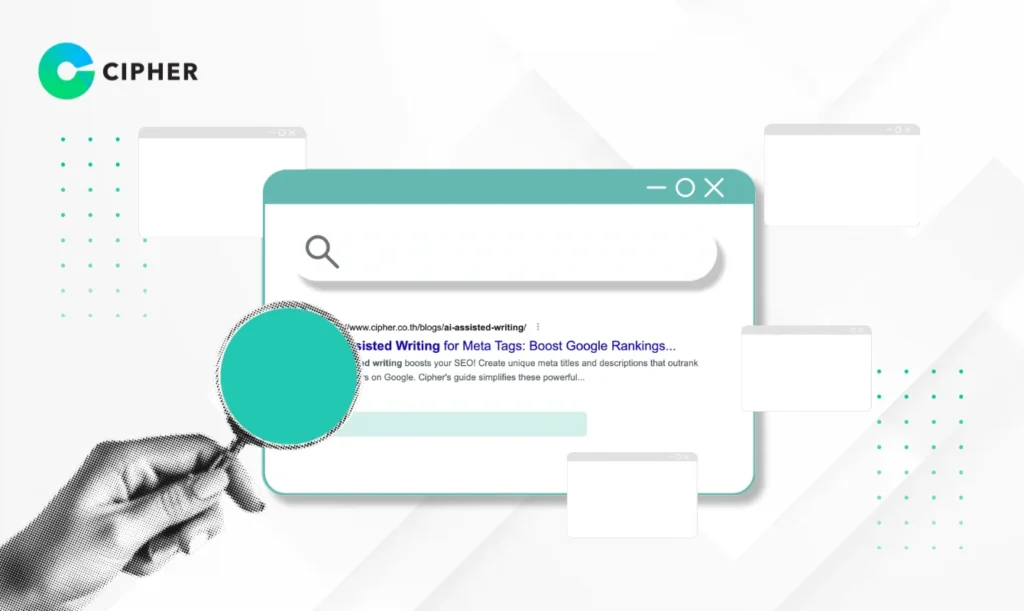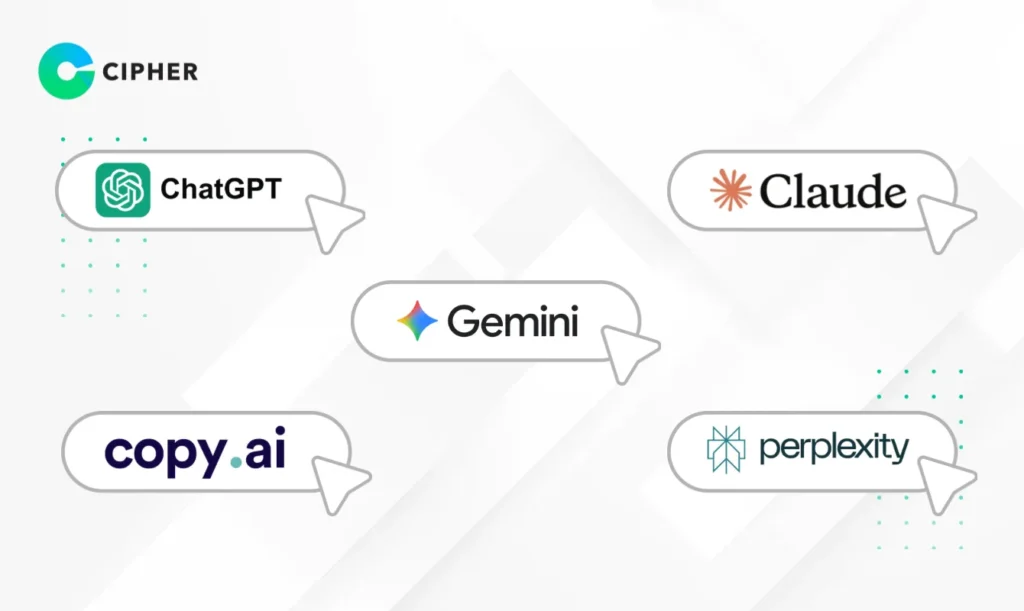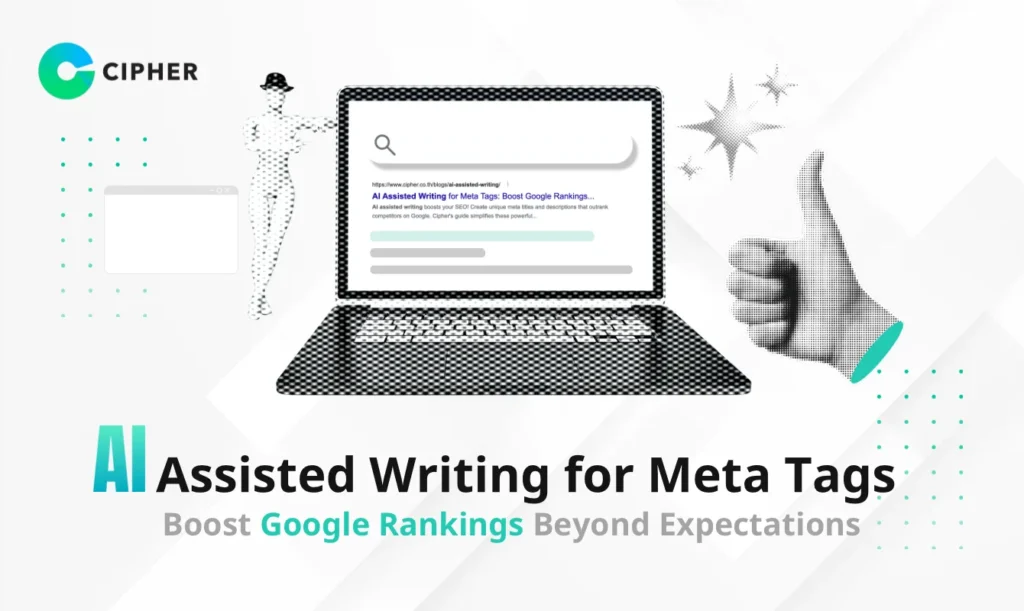In an era where AI assisted writing plays an increasingly important role in our daily lives, online businesses are adopting this technology for Digital Marketing, especially for SEO to effectively rank their websites on Google. One crucial technique that shouldn’t be overlooked is creating compelling Meta Titles and Meta Descriptions that appeal to both readers and Google. But how can you make this content natural and unique? Today, we’ll explore how to use AI content tools to create Meta Tags that will help your website stand out from competitors.
Table of Contents
What Are Meta Title and Meta Description and Why Are They Important for SEO?

Meta Tags are HTML code elements embedded in web pages. They don’t display directly on the webpage but appear in Google search results and help search engines better understand your website’s content. AI assisted writing can help you develop Meta Tags more efficiently.
What is a Page Title (Meta Title)?
A Page Title or Meta Title is a short, one-line phrase that appears as a blue heading in Google search results and displays on browser tabs. The HTML code format is:
<>This is a sample Title<>
Titles are extremely important for SEO ranking because Google uses them as a primary indicator of what the page is about, directly affecting your website’s ranking. If you want to learn more about basic SEO, you can read our easy-to-understand SEO guide.
What is a Meta Description?
A Meta Description is a brief summary explaining the page’s content, approximately 1-2 lines long (or 150-160 characters for English). It appears below the Title in search results. The HTML code format is:
<meta name=”description” content=”This is a sample Meta Description”>
While Meta Descriptions may not directly impact Google rankings, they are crucial for increasing Click-Through Rate (CTR) as they help users decide whether to click on your website. Using AI content generators to develop Meta Descriptions will help you reach your target audience more effectively.
Why Use AI Assisted Writing for Meta Titles and Descriptions?
Writing good Meta Titles and Descriptions requires various skills, including choosing words that match users’ search intent, keyword analysis, and writing compelling click-worthy content. AI content tools can make this process easier and more efficient with these benefits:
- Time-saving: Reduce thinking and writing time from hours to minutes
- Fresh ideas: AI assisted writing helps create content and offers perspectives or writing styles you might not think of
- Better keyword analysis: Helps find relevant LSI Keywords to strengthen your SEO
- Target audience-focused content: Accurately analyzes search intent, making content more relevant to users
- Creates differentiation: Offers writing that doesn’t duplicate competitors, making your website stand out
Using efficient SEO analysis tools like Ahrefs together with AI content generators will help you develop better Meta Tags.
Writing Meta Tags for Different Personas
1. Result-Driven Entrepreneur
Characteristics: Business owners or executives with limited time who want clear results, interested in ROI rather than technical details.
Meta Title Writing Style:
- Emphasize numbers and tangible results
- Use words that convey efficiency and speed
- Include a clear timeline
Example: “Increase Clicks by 45% in 30 Days with AI-Powered Meta Tags | Proven Method”
AI Prompt: “Help write a Meta Title and Description for an article about using AI assisted writing for Meta Tags targeting business owners who want quick results. Emphasize clear result metrics and timeline.”
2. Digital Marketer
Characteristics: Marketing professionals who understand technical terms, looking for new tools and strategies to improve efficiency.
Meta Title Writing Style:
- Use technical terminology
- Emphasize latest techniques or strategies
- Mention competitive advantages
Example: “17 AI Techniques to Optimize CTR for Meta Tags | Beat Competitors with NLP and Machine Learning”
AI Prompt: “Help write a Meta Title and Description for an article about using AI content tools for Meta Tags targeting professional digital marketers. Use technical terms they’re familiar with, emphasize latest strategies and ways to outperform competitors.”
3. Content Creator
Characteristics: People who regularly create content, wanting to work more efficiently, interested in content quality and creativity.
Meta Title Writing Style:
- Emphasize creativity and inspiration
- Mention time-saving methods
- Show how it helps create quality content
Example: “Unlock Creative Potential with AI Assisted Writing for Meta Tags | Create Quality Content in 10 Minutes”
AI Prompt: “Help write a Meta Title and Description for an article about using AI content generators for Meta Tags targeting content creators. Emphasize time-saving, creativity, and methods to create quality content.”
4. Small Business Owner
Characteristics: Limited resources, wanting to do SEO themselves, interested in cost-effective and efficient methods.
Meta Title Writing Style:
- Emphasize value and cost-effectiveness
- Show it’s easy and uncomplicated
- Mention that hiring experts isn’t necessary
Example: “DIY SEO: Free AI Writing Tools for Meta Tags | How to Get Your Website on Google’s First Page”
AI Prompt: “Help write a Meta Title and Description for an article about using AI content tools for Meta Tags targeting small business owners. Emphasize cost-effective methods, ease of use, and not needing to hire professionals.”
5. SEO Specialist
Characteristics: Has in-depth SEO knowledge, interested in algorithm updates and advanced techniques, wants detailed and up-to-date information.
Meta Title Writing Style:
- Use advanced SEO technical terms
- Reference latest algorithms or Google updates
- Emphasize advanced strategies and insights
Example: “AI Assisted Writing for Semantic Analysis of Meta Tags | Entity SEO Techniques for Google SGE”
AI Prompt: “Help write a Meta Title and Description for an article about using AI content generators for Meta Tags targeting SEO specialists. Use advanced technical terms, reference latest Google algorithms, and emphasize advanced strategies.”
Using AI Content Tools to Customize Meta Tags for Personas
When using AI writing tools to customize Meta Tags for each persona, follow these steps:
- Define the persona clearly: Specify the characteristics, needs, and interests of your target audience
- Communicate in detail with AI: Explain the persona’s characteristics so the AI content generator understands, including knowledge level, interests, and problems they want to solve
- Test multiple formats: Ask the AI writing tool to create several Meta Tag versions to compare and choose the best
- Measure and improve: Check if the created Meta Tags actually attract the target audience and improve based on results
Using AI assisted writing according to personas will help you target your audience more precisely, increasing the chances of ranking and getting clicks from users who are most likely to become your customers.
Popular AI Content Tools for Writing Meta Titles and Descriptions

1. ChatGPT
ChatGPT is a versatile AI content generator that supports both Thai and English. This AI writing tool helps create Meta Titles and Descriptions easily with clear prompts.
Strengths:
- Easy to use, doesn’t require much technical knowledge
- Creates content in various formats
- Understands conversation context well
Limitations:
- May provide information that isn’t 100% accurate without verification
- Overly complex commands may produce undesired results
2. Claude
Claude is an AI content tool with natural Thai language understanding capabilities. This advanced writing tool helps create content for Meta Tags that require high naturalness.
Strengths:
- Produces natural, readable results similar to human writing
- Remembers conversation context for extended periods
- Processes accurately and converses smoothly
Limitations:
- Cannot directly search Google
- Free version has limitations, requires Premium subscription at approximately $20 per month
3. Gemini
Developed by Google, Gemini excels at searching for information and retrieving the latest updates from Google, which is very beneficial for AI assisted writing for Meta Tags that require current information.
Highlights:
- Can pull latest information from Google
- Processes information from images or website links
- Understands keyword context and search intent well
Limitations:
- May create content that’s too short for longer articles
- Complex commands may yield inaccurate results
4. Copy.ai
Copy.ai is designed specifically for writing tasks. This specialized AI content generator can customize brand voice as needed and is one of the most popular writing tools for marketing professionals.
Strengths:
- Customizes brand tone
- Has Team Spaces for collaborative work
- Offers ready-made templates for Meta Tags
Limitations:
- Thai language output isn’t as natural as it should be
- Free version limited to 2,000 words per month
5. Perplexity
Perplexity combines AI writing technology with in-depth information searching, helping to gather information from reliable sources to support AI assisted writing for your content marketing needs.
Strengths:
- Summarizes information from websites or YouTube videos
- Clearly shows information sources
- Provides related questions to expand ideas
Limitations:
- Information may not always be up-to-date
- Doesn’t create interesting headlines, requires manual adjustment
AI SEO technology continues to develop. You can follow the latest information about AI writing tools to update new techniques for content creation.
How to Effectively Use AI Assisted Writing for Meta Titles and Descriptions
Steps for Writing Meta Titles with AI Content Tools
- Analyze primary keywords first: Before using AI assisted writing, research keywords that are relevant to your article
- Write clear prompts: Specify main keywords and requirements clearly, such as “Help write a Meta Title for an article about ‘AI assisted writing’ using the main keyword ‘AI content generator’, with no more than 60 characters, that entices people to click”
- Try multiple formats: Ask AI writing tools to create several Title versions to compare and select the best
- Check and customize: Review the Title’s length and adjust to make it more natural
- Make it specific: Ensure the Title is specific and not duplicated with other pages
Techniques for Writing Meta Descriptions with AI Content Generators
- Prepare important information: Gather key points from the article that should appear in the Description
- Define the desired format: Specify the writing style, such as whether to include a Call-to-Action
- Use detailed commands: Use AI writing tools by providing commands that specify details for a targeted Description, such as “Help write a Meta Description for the article ‘How to Use AI Assisted Writing for Meta Titles and Descriptions’ with the keyword ‘AI content tool’ at the beginning, with no more than 155 characters, with a click incentive, and stating benefits readers will receive”
- Test multiple writing tools: Try several AI content generators to compare results, like using Gemini for latest information, then adjusting with Claude for naturalness
- Check length: Ensure the Description is an appropriate length (150-160 characters)
Combining Multiple AI Writing Tools for Best Results
Using AI assisted writing by combining multiple tools will enhance strengths and reduce weaknesses of each tool:
- Start with information search: Use Perplexity or Gemini to search information and plan content
- Create structure: Have ChatGPT create an SEO-appropriate structure
- Adjust language: Use Claude to make language natural and readable
- Customize tone: Use Copy.ai to adjust Tone of Voice to match your brand
- Final check: Use SEO checking tools like Yoast SEO to evaluate results
Principles for Writing Good Meta Titles and Descriptions with AI Content Tools
Good Title Writing Principles
- Include main keywords in the sentence: Ask AI content generators to help create content with the main keyword “AI assisted writing” in the Title sentence so that Google understands the page content
- Place keywords at the beginning: Suggest AI writing tools place main keywords in the first 2-3 words, not at the end
- Focus on one topic: Titles should be concise, focusing on a single point aligned with the main keyword
- Analyze Search Intent: Before writing Titles, analyze what users want from searching that term, such as information, short answers, or long explanations
- Create differentiation: Use AI content tools to help write articles differently from other ranking websites, and not duplicate other pages on the same website
- Appropriate length: Titles should be 30-60 characters (for English) or check the length gauge in SEO Plugins
- Write for readers, not Google: Use correct, readable language, not just keyword strings
Good Description Writing Principles
- Include main keywords: Descriptions should include the main keyword “AI assisted writing,” not necessarily as the first word but in the beginning or middle
- Enhance with secondary keywords: Include 1-2 secondary keywords like “AI content tool” or “writing tools” to increase ranking chances
- Summarize all content: Descriptions should summarize the entire page, extracting key points from subheadings
- No duplication with other pages: Each page should have non-duplicate Descriptions for specificity
- Appropriate length: Should be 150-160 characters (for English) or check the SEO Plugin field
- Make it appealing to read: Use natural, concise language that effectively summarizes content
Cautions When Using AI Writing Tools for Meta Tags
While AI assisted writing is a powerful approach, it has limitations that deserve caution:
- Information may not be 100% accurate: Always verify information provided by AI content generators and ask for sources to verify
- Language may lack naturalness: Especially in Thai, AI writing tools may create sentences that lack fluency, requiring additional adjustment
- Use AI as assistance, not a complete replacement: AI content tools help create content well but can’t solve complex problems or understand context as well as humans. Use them alongside your own knowledge
- Avoid keyword stuffing: AI may try to include too many keywords; adjust for natural reading
- Check length: AI may create content that’s too long; check to ensure appropriate length
CIPHER: AI-Powered SEO Services Experts
At CIPHER, we have a comprehensive Digital Marketing expert team ready to use AI assisted writing technology to enhance SEO efficiency for your business. We offer AI-Powered SEO services including:
Meta Tags Optimization with AI
AI Content Creation for SEO
Keyword Research & Analysis with AI
SEO Data Analytics with AI
Technical SEO Audit with AI
Check technical issues that may affect SEO ranking with AI and advanced tools, offering targeted solutions.
With experience managing and developing systems for leading national brands, we understand professional online management needs and methods, ready to adapt AI assisted writing technology for your business. We also offer website design and development services that integrate SEO with design from the start.





